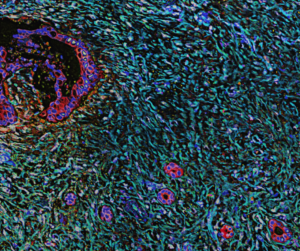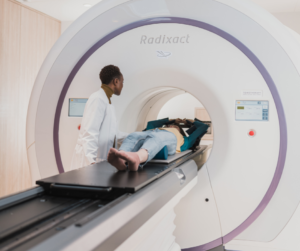Introduction
Cluster of differentiation 40 (CD40) is a costimulatory molecule that is expressed by B cells, antigen-presenting cells, non-immune cells, and tumors, which makes this molecule an emerging immunotherapy target in Phase I clinical trials (Li & Wang, 2020). Although the most common adverse events (AEs) reported in anti-CD40 clinical trials are cytokine release storm, thromboembolic events, and hepatotoxicity (Li & Wang, 2020), rare AEs such as ST elevation myocardial infarction (STEMI) may occur. Given that STEMI can represent severe types of myocardial injury, early recognition and management by interprofessional teams is key to improving patient outcomes.
By Fedricker D. Barber, PhD, ANP-BC, AOCNP, FAANP, FAAN1 and Myrshia L. Woods, MHS, PA-C2
Author’s note:
- University of Texas MD Anderson Cancer Center, Dept. of Investigational Therapeutics (A Phase I Program)
- University of Texas MD Anderson Cancer Center, Dept. of Cardiology
We have no conflicts of interests to disclose
Correspondence concerning this article should be addressed to Fedricker D. Barber, 1515 Holcombe Blvd, Unit 455, Houston, TX 77030. Email: dbarber@mdanderson.org
Case Report
A 69-year-old African American male with refractory metastatic malignant acral lentiginous melanoma presented to the emergency room (ER) with new onset of severe fatigue and dizziness over the last 24 hours. The patient’s past medical cardiac history is significant for longstanding hypertension that was medically controlled and moderate aortic stenosis. He is currently status post 2 cycles of a Phase I clinical trial consisting of an anti-CD40 monoclonal antibody which was discontinued 3 weeks prior secondary to progression of disease. On arrival to the ER, physical examination revealed heart rate 78, respirations 19, blood pressure 86/66, temperature 36.8, and oxygen saturation 99% room air. The rest of the physical examination was unremarkable. Electrocardiogram (EKG) showed normal sinus rhythm at 67 beats per minute, with prominent and diffuse ST elevation noted in V1, V2 and lateral precordial leads. Echocardiogram showed normal left ventricle systolic function with ejection fraction of 63% and no effusion.
The patient reportedly took prescribed losartan and amlodipine the morning prior to presenting to the ER. Laboratory data showed a white blood count 13.2 K/uL, hemoglobin 9.1 gm/dL, platelet count 457 K/uL, sodium 133 mEq/L, potassium 4.6 mEq/L, blood urea nitrogen 16 mg/dL, creatinine 1.42 mg/dL, glucose 134 mg/dL non-fasting, calcium 8.1 mg/dL, magnesium 2.8 mEq/L, albumin 3.2 gm/dL, total bilirubin 1.1 mg/dL, aspartate aminotransferase 159 U/L, alanine transaminase 182 U/L, amylase 26 U/L, lipase 22 U/L, creatine kinase 17.9 U/L, Troponin T 2,137 ng/ml, N-terminal pro-brain natriuretic peptide 2,462 pg/mL, international normalized ratio 1.40, prothrombin time 16.3 seconds, partial thromboplastin time 33.2 seconds, D-Dimer 7.54 ng/mL. Positron emission tomography computed tomography showed increased melanoma burden of the head, lung, lymph nodes, bone, soft tissue, peritoneum, and intraperitoneal organs. Cardiology was consulted and the patient was admitted to telemetry initially for presumed STEMI.
The patient consistently denied experiencing any type of chest discomfort or angina. Repeat cardiac enzymes showed significant elevation in the Troponin T level which peaked at 3, 552 ng/ml. Initially, the patient was managed conservatively with intravenous heparin without bolus, aspirin 81 mg, high dose statin, intravenous fluids (IV), and trending of cardiac enzymes. Unfortunately, the troponin T remained elevated, which prompted a left heart catheterization which showed minimal coronary artery luminal irregularities. The left heart catherization showed no focal stenosis or occlusive disease to explain the patient’s EKG and clinical presentation. Therefore, acute myocarditis was suspected secondary to the CD40 agonist. The patient was started on methylprednisone 1000 mg intravenous every 24 hours which resulted in a downward trend of the troponin T (from 3552 ng/ml to 613 ng/ml). Afterwards, the IV methylprednisone was changed to a 6-week tapering dose of oral prednisone and the IV heparin was switched to enoxaparin sodium 40 mg subcutaneous every 24 hours. Subsequently, the patient was discharged from the hospital, and seen in the clinic and referred to home hospice secondary to progression of his cancer. Informed consent was obtained from the patient.
Discussion
Acute ST elevation represents an emergent cardiac condition and prompt invasive intervention is warranted to improve patient outcomes. Immediate evaluation for STEMI is priority as this presents the greatest risk for early mortality (Jung & Elsässer, 2018). This patient’s clinical presentation was atypical, remained asymptomatic without any symptoms of ischemia or signs of cardiac decompensation. In the setting of significant widespread oncologic disease burden, in correlation with the timing of his recent immunologic cancer therapy, consideration of possible cardiac induced side effects must be noted by the responsible clinicians. It is well established that melanoma can directly invade the myocardium, and in the setting of treatment with a monoclonal antibody, there is risk for an immunologic “attack” on the myocardial cells which may have already been invaded directly by the melanoma (Zitzelsberger et al., 2017). The patient was noted to have “clean” coronaries on coronary angiography which ruled out an ischemic cause for the acute myocardial injury, highlighting acute myocarditis secondary to immunotherapy as the obvious diagnosis.
Conclusion
AEs such as STEMI or acute myocarditis require prompt recognition and intervention to optimize patient outcomes. As anti-CD40 monoclonal antibodies enter day-to-day clinical practice, it is imperative that interprofessional teams are established to improve the early recognition and management of rare and potentially life-threatening AEs.
References
Jung, C., & Elsässer, A. (2018, Jun). [Update ESC Guideline 2017 – Acute Myocardial Infarction (STEMI)]. Dtsch Med Wochenschr, 143(11), 797-801. https://doi.org/10.1055/a-0494-0341 (Update ESC-Leitlinie 2017 – Akuter Myokardinfarkt (STEMI).)
Li, D. K., & Wang, W. (2020, Nov). Characteristics and clinical trial results of agonistic anti-CD40 antibodies in the treatment of malignancies. Oncol Lett, 20(5), 176. https://doi.org/10.3892/ol.2020.12037
Zitzelsberger, T., Eigentler, T. K., Krumm, P., Nikolaou, K., Garbe, C., Gawaz, M., & Klumpp, B. (2017, Jul 1). Imaging characteristics of cardiac metastases in patients with malignant melanoma. Cancer Imaging, 17(1), 19. https://doi.org/10.1186/s40644-017-0122-8

Fedricker D. Barber, PhD, ANP-BC, AOCNP, FAANP, FAAN
Manager of Advanced Practice Providers – Dept. of Investigational Cancer Therapeutics – The University of Texas MD Anderson Cancer Center

Myrshia L. Woods, MHS, PA-C
Dept. of Cardiology – University of Texas MD Anderson Cancer Center







